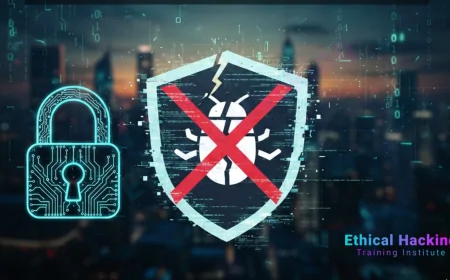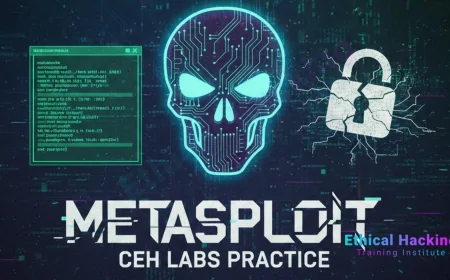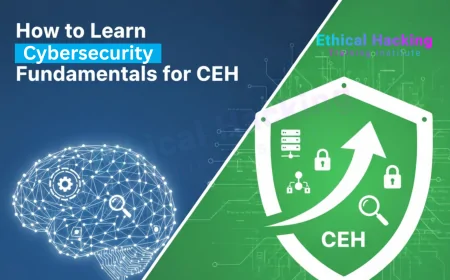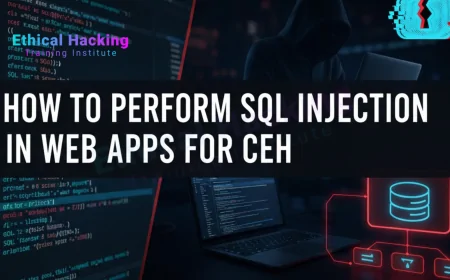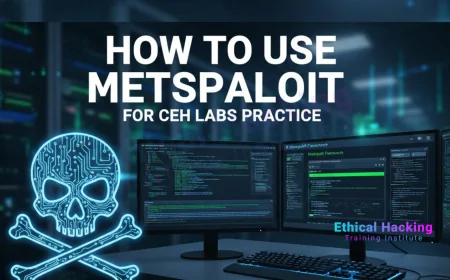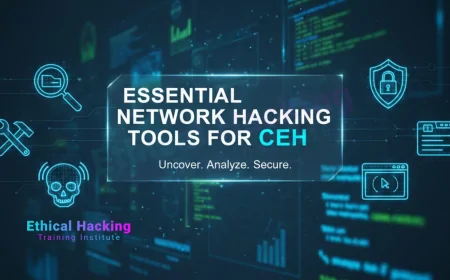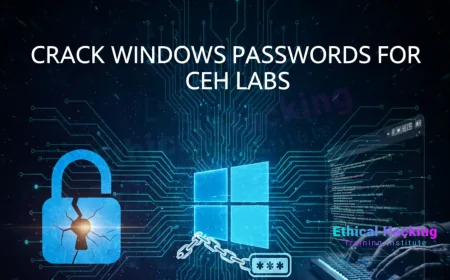Master Hacking: A Full Course Guide for Ethical Hackers | Ethical Hacking Masterclass: Complete Course Guide for Future Cyber Experts
Master ethical hacking with this complete guide—covering course curriculum, tools, labs, exam prep, career paths, and FAQs for aspiring hackers.
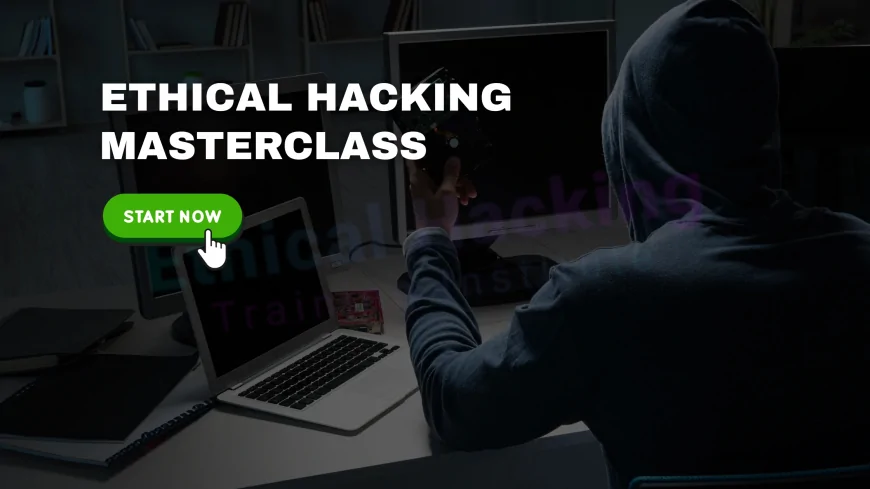
Table of Contents
- Introduction
- Why Ethical Hacking?
- Your Ethical Hacking Learning Path
- Essential Tools & Platforms
- Course Curriculum Overview
- Lab Infrastructure & Practice
- Exam & Certification Prep
- Career Paths in Ethical Hacking
- Advanced Specializations
- Soft Skills & Communication
- Success Tips
- Frequently Asked Questions
- Conclusion
Introduction
Ethical hacking combines offense and defense to assess digital systems. This full-course guide is designed for beginners and professionals alike. It gives you a step-by-step roadmap—from mastering tools to landing your first cybersecurity role.
Why Ethical Hacking?
The rise in cyberattacks makes organizations prioritize proactive defenses. Ethical hackers simulate real-world hacking to safeguard networks, systems, and data. They hold vital roles in pen-testing, secure software development, and threat intelligence.
Your Ethical Hacking Learning Path
- Foundation: Networking, operating systems, and programming basics
- Intermediate: Reconnaissance, exploitation, web hacking
- Advanced: Cloud, IoT, malware reverse engineering, privileged attacks
- Specialized: Mobile, cloud pen-testing, red teaming, secure code auditing
- Certification: CEH, PenTest+, OSCP, others
Essential Tools & Platforms
You’ll use real-world hacking tools and platforms:
- Nmap – Network scanning
- Wireshark – Packet analysis
- Metasploit – Exploitation framework
- Burp Suite – Web app testing
- John the Ripper, Hydra – Password cracking
- Kali Linux – Hacking-focused OS
- VirtualBox/VMware – Lab virtualization
- TryHackMe, HackTheBox, iLabs – Cloud lab platforms
Course Curriculum Overview
- Information security basics & ethical hacking concepts
- Reconnaissance & scanning techniques
- System exploitation & privilege escalation
- Web app testing (SQLi, XSS, CSRF)
- Wireless & network attacks
- Malware basics & detection techniques
- Cloud and container security
- IoT & embedded device hacking
- Reverse engineering & binary exploitation
- Report writing, compliance, and methodology
Lab Infrastructure & Practice
Hands-on learning is critical. Build a safe lab using:
- Local VM setups (Kali Linux, Metasploitable, OWASP targets)
- Cloud labs from TryHackMe, HackTheBox, and iLabs
- Realistic CTF-style challenges
Practice Weekly with structured labs tailored to each topic to build expertise.
Exam & Certification Prep
Recommended certs include:
- CEH – Broad ethical hacking certification
- CompTIA PenTest+ – Hands-on testing across environments
- OSCP – Intensive 24-hour practical exam
- Other specialized certs like eJPT, GPEN, CWSP
Combine reading, labs, practice exams, and hands-on projects for effective preparation.
Career Paths in Ethical Hacking
- Ethical Hacker / Penetration Tester
- Security Analyst / Vulnerability Assessor
- Red Team Operator
- Threat Intelligence Analyst
- Security Consultant or Auditor
Advanced Specializations
After foundational work, consider specializing in:
- Cloud Penetration Testing (AWS, Azure, GCP)
- Mobile Hacking & Reverse Engineering
- Embedded Systems & Firmware Analysis
- OSCP, Advanced Red Team, Incident Response
Soft Skills & Communication
Success isn't just technical—ethical hackers also need:
- Report writing and presentation skills
- Risk management and compliance awareness
- Teamwork and client communication
Success Tips
- Document labs and solutions in a knowledge base
- Contribute to open source or CTF community
- Network at conferences (Defcon, BSides, Local meetups)
- Regularly refresh skills on TryHackMe and HackTheBox
Frequently Asked Questions
1. What is ethical hacking?
Ethical hacking involves testing systems and networks to find vulnerabilities legally and help fix them.
2. Do I need coding skills?
Basic scripting (Python, Bash) helps, though many tools work without coding skills.
3. Which certification is best beginner level?
CEH or CompTIA PenTest+ are great for entering ethical hacking.
4. How to build a home hacking lab?
Use VirtualBox/Vmware to host Kali Linux and vulnerable VMs like Metasploitable.
5. What tools should I learn first?
Start with Nmap, Wireshark, Metasploit, Burp Suite, and John the Ripper.
6. Are online labs effective?
Yes—platforms like HackTheBox provide realistic environments and community support.
7. How long to become job-ready?
With consistent effort, 6–12 months can lead to a job in junior or associate roles.
8. Is ethical hacking legal?
Yes, when performed with explicit authorization or under legal frameworks.
9. Can I start without a technical background?
Yes—basic networking and computer knowledge is enough to begin.
10. What is a CTF?
Capture-The-Flag challenges simulate hacking scenarios across multiple domains.
11. How to stay updated on vulnerabilities?
Follow security blogs, vulnerability feeds (CVE), advisories, and security mailing lists.
12. Is OSCP worth pursuing?
Yes—OSCP proves deep technical ability and is highly respected in cybersecurity.
13. Can I hack social engineering?
Social engineering is part of ethical hacking—testing policies to improve security awareness.
14. How to document my lab work?
Maintain a GitHub or personal blog with step-by-step reports for each lab.
15. Should I join security communities?
Yes—forums like Reddit, Discord groups, and InfoSec meetups provide support and insight.
16. How to prep for job interviews?
Show your certification, completed labs, CTF wins, and articulate attack-defense processes in interviews.
17. What is the outlook for ethical hackers?
Demand continues rising globally—positions open in finance, tech, government, and startups.
18. Are bug bounty programs useful?
Yes—they offer real-world experience, recognition, and potential income.
19. Can ethical hacking be done remotely?
Absolutely—remote labs and collaborative tools make remote pentesting feasible and effective.
20. What's next after finishing this guide?
Beyond certifications, aim for hands-on projects, specialize in a domain, and possibly pursue advanced degrees or security roles.
Conclusion
Becoming an ethical hacker is a transformative journey—beginning with foundational knowledge, strengthened through labs, and validated by certifications. With continual practice and specialization, this career offers purpose, challenge, and global opportunity.
What's Your Reaction?
 Like
0
Like
0
 Dislike
0
Dislike
0
 Love
0
Love
0
 Funny
0
Funny
0
 Angry
0
Angry
0
 Sad
0
Sad
0
 Wow
0
Wow
0
